For a man who had never milked a cow up to 10 years ago, Diarmuid Scannell is making fair progress.
From a farming background in Cuil Aodha, a Gaelteacht in mid-Cork, Diarmuid’s first time milking a cow was while travelling in New Zealand in 2011.
Diarmuid and then-girlfriend Briege Corkery were travelling the world and worked on a farm to earn money and pay for the next flight.
Their strong work ethic made them get noticed and they were asked to stay on in New Zealand to manage the farm, but they already had their flights booked to South America before coming back to Ireland.
At that stage, Briege was only half-way to winning 18 All-Ireland medals with Cork camogie and football teams.
Upon returning home, Diarmuid started working on Michael Bateman’s farm in Cork.
By the end of 2018, Briege and Diarmuid were married and in a sharemiking type arrangement with the Batemans, whereby they owned 100 milking cows and 50 in-calf heifers.
They were ready for their next move and took on a 15-year lease on an existing dairy farm at Ballincollig, on the western side of Cork city.
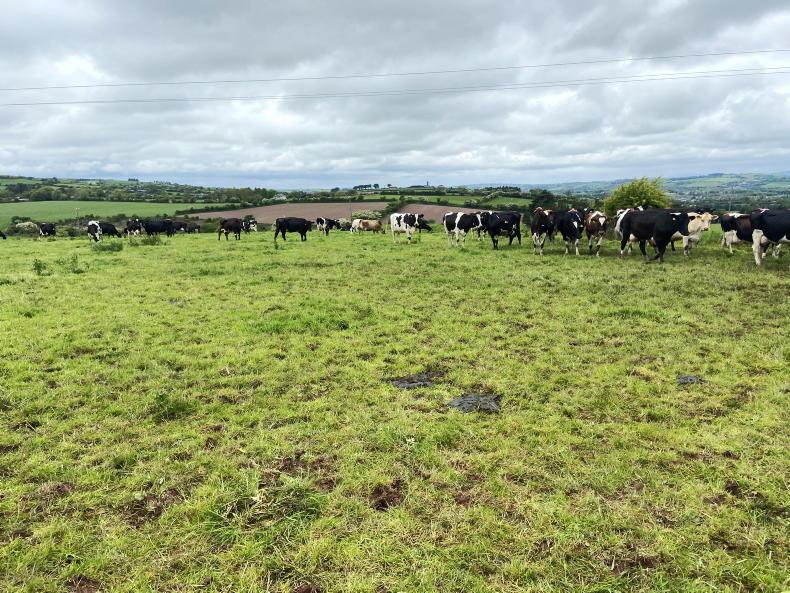
Sixty cows were sent back to improve the clean-out on the last grazed paddock.
Today, they are milking 220 cows and farming 96ha at Ballincollig, with 77ha in the milking block.
The overall stocking rate is 2.3 cows/ha this year, with 2.86 cows/ha on the milking block.
The plan is to go to 250 cows next season, which will increase the stocking rate to 3.2 cows/ha and 2.6 cows/ha overall.
The 70 in-calf heifers and 90 heifer calves are contract-reared by both Briege’s father and Diarmuid’s father at Coachford and Cuil Aodha.
Now in their third season at Ballincollig, the pair are flying it.

The farm is close to the town of Ballincollig on the outskirts of Cork city.
Diarmuid says it’s a super farm: “It’s an exceptionally dry farm. There’s 2ft of topsoil above shale. Droughts are a much bigger worry than being too wet, so we need to be careful in the summer that we don’t run into bother if things get very dry. We have enough rain got now, so I know we’ll be OK for the next month.
“The stocking rate is currently 3.75 cows/ha, which is a demand of 64kg/day. I did push the farm harder in previous years, but not anymore. There’s enough stress in life without having to worry about having enough grass,” Diarmuid says.
Instead of closing up more ground for long-term silage, he’ll take surplus grass out for bale silage if the need arises.
He already has these fields identified, being across the road from the main yard.
“That’s my buffer. It’s in the wedge, but I don’t want to graze it as it’s a bit far for the cows to be walking and we need to cross the road to get to it.
“If I end up having to cut it for bales two or three times, then what about it? And if things get tight, then it’s there to be grazed.
“It’s probably catching me a little bit at the moment because I’m grazing some higher covers than I’d like to near the yard.”
These higher covers are at 1,600kg to 1,700kg/ha, so are at the higher end of the target range. Conditions over the last four weeks have been difficult, despite being on a dry farm.
The effect has been a reduction in post-grazing residuals and more rejected areas. Dealing with these quality issues will be the priority over the coming weeks.
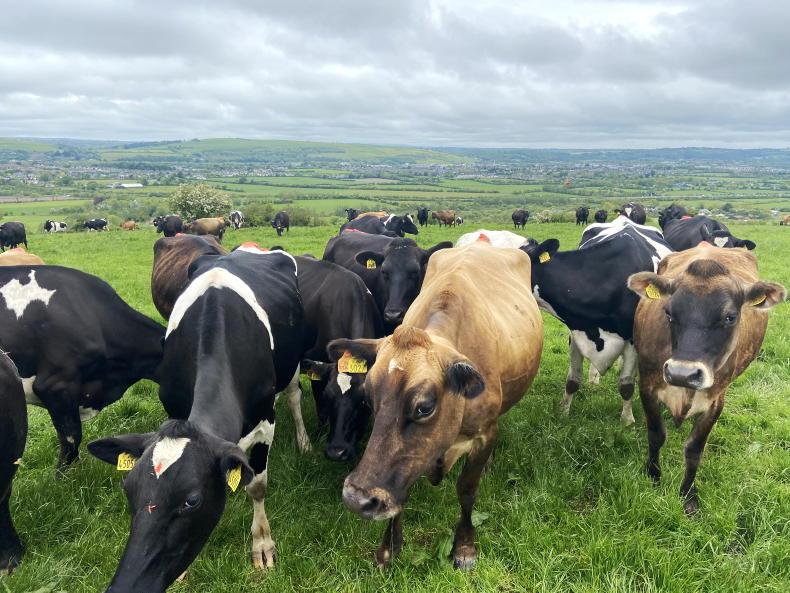
The herd is mostly Jersey crossbred.
Diarmuid is going to tackle this in three ways in order of priority:
1. Selecting poorer-quality grass for bale silage.
2. Pre-mowing some paddocks ahead of the cows.
3. Topping after grazing.
There’s no mower on the farm, so all pre-mowing is done by contractor.
Diarmuid hasn’t done any topping yet since he came to Ballincollig and would rather not have to, not least because it will dirty the contractor’s mower.
Last year, he spent around €600 on pre-mowing, but expects the figure to be higher this year, as he feels more paddocks will need to be mechanically corrected.
When the Irish Farmers Journal visited the farm last Friday, the cows were split into two groups.
One group of 60 cows was finishing off the paddock the whole herd had been in the day before.
There was 22mm of rain on Thursday, which was unwanted and unexpected, so clean-out was poor.
Instead of leaving all the cows back into the paddock for a few hours, Diarmuid estimated the cover that was left, multiplied it by the area of the paddock and divided it by 8kg, as that’s how much grass he’s allocating on a 12-hour basis.
This told him that 60 cows would get the day grazing there, so the first 60 cows out of the parlour on Friday morning went back to that paddock and the rest went on to the next one.
This is something Diarmuid says he might do once or twice a week or whenever it’s necessary.
He aims for three grazings per paddock, but that’s not always achievable, depending on paddock size and pre-grazing yield.
Sixty percent of the farm has been reseeded in the past three years and there’s a high clover content in all of the reseeded pastures.
Diarmuid’s spreading 20 units/acre of protected urea after grazing.
Soil fertility is reasonably good now, having corrected a lot of the low-index fields over the past few years.
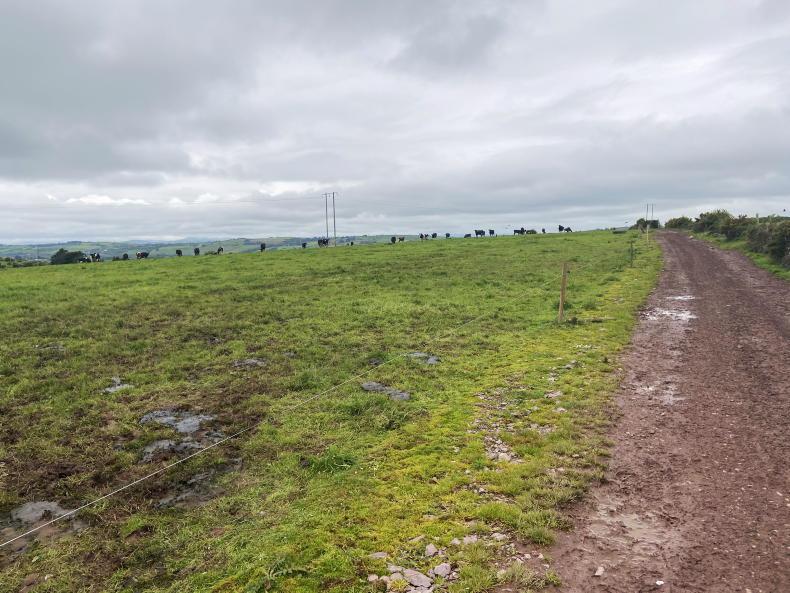
The paddock the cows were in on Thursday after 22mm of rain.
Performance
and the future
The farm grew 14.8t DM/ha last year, up from 11t DM/ha in 2019.
Animal performance is really good, with the Jersey-crossbred herd selling 520kg MS/cow from 900kg of meal in 2020.
Empty rate last year was 7% after 12 weeks of breeding. Cow numbers increased from 154 last year to 220 this year with the inclusion of 80 heifers.
The target for this year is to deliver 500kg MS/cow from 700kg of meal per cow. Some 310kg of meal per cow has been fed to date.
Briege and Diarmuid have been working hard, trying to save money and at the same time building up the herd to the current level.
Diarmuid’s home farm of 29ha has been transferred over to him and he has used it as collateral to secure a loan. Overall debt levels are close to average.
Inside the farm, the plan for this year is to extend the parlour from 14 units to 20 units.
The milking pit has already been extended, so the job now is to install a new plant when the cows are dried off.
There is enough slurry storage and cubicle housing on the farm for the larger numbers, but this is spread out over three yards.
The Scannells are fortunate to be supplying milk to Dairygold Co-Op and not to Glanbia, so are unaffected by peak milk restrictions.
“I’ve been thinking about it and I don’t know what I’d do if I was a Glanbia supplier. We supplied 840,000 litres in 2020, we plan to supply 1.2m litres this year and 1.5m litres in 2022. Given the commitments we’ve made and the plans we have in place, I’d be goosed,” Diarmuid says.
He says the biggest challenge since taking on the farm has been to manage cashflow.
The first few years in any new business are tight, even when performance is good. Cash is much freer now, so Diarmuid has to be disciplined around spending.
His medium- to long-term plan is to consolidate, with no immediate plans for further growth. Land ownership is not a priority. His biggest thrill was getting the first milk statement with his name written on the top.
Every now and again he tots up his net worth - what they’d have left if they sold the stock, machinery and paid off the debt.
“I joke to Briege every so often about selling up and getting a job in a factory in the city, making €25 per hour.”
Would he do it?
“I’d be like that bull over,” he says, pointing to a Jersey crossbred bull in a paddock next to the yard, “I’d feel trapped and like I was in prison.”
Subject to planning permission, they hope to buy a site off the farm owners and build a house on the farm to raise their children in the next year. The main lease on the farm is for 15 years, so Ballincollig will be home for the foreseeable future.
For Diarmuid and Briege, dairying has given them the opportunity to start farming from scratch, earn a good living, live close to their families and bring up their own two children in the countryside.
Recent moves by dairy processors and soundings from government ministers will likely close that door for other young couples looking to do the same.
For a man who had never milked a cow up to 10 years ago, Diarmuid Scannell is making fair progress.
From a farming background in Cuil Aodha, a Gaelteacht in mid-Cork, Diarmuid’s first time milking a cow was while travelling in New Zealand in 2011.
Diarmuid and then-girlfriend Briege Corkery were travelling the world and worked on a farm to earn money and pay for the next flight.
Their strong work ethic made them get noticed and they were asked to stay on in New Zealand to manage the farm, but they already had their flights booked to South America before coming back to Ireland.
At that stage, Briege was only half-way to winning 18 All-Ireland medals with Cork camogie and football teams.
Upon returning home, Diarmuid started working on Michael Bateman’s farm in Cork.
By the end of 2018, Briege and Diarmuid were married and in a sharemiking type arrangement with the Batemans, whereby they owned 100 milking cows and 50 in-calf heifers.
They were ready for their next move and took on a 15-year lease on an existing dairy farm at Ballincollig, on the western side of Cork city.

Sixty cows were sent back to improve the clean-out on the last grazed paddock.
Today, they are milking 220 cows and farming 96ha at Ballincollig, with 77ha in the milking block.
The overall stocking rate is 2.3 cows/ha this year, with 2.86 cows/ha on the milking block.
The plan is to go to 250 cows next season, which will increase the stocking rate to 3.2 cows/ha and 2.6 cows/ha overall.
The 70 in-calf heifers and 90 heifer calves are contract-reared by both Briege’s father and Diarmuid’s father at Coachford and Cuil Aodha.
Now in their third season at Ballincollig, the pair are flying it.

The farm is close to the town of Ballincollig on the outskirts of Cork city.
Diarmuid says it’s a super farm: “It’s an exceptionally dry farm. There’s 2ft of topsoil above shale. Droughts are a much bigger worry than being too wet, so we need to be careful in the summer that we don’t run into bother if things get very dry. We have enough rain got now, so I know we’ll be OK for the next month.
“The stocking rate is currently 3.75 cows/ha, which is a demand of 64kg/day. I did push the farm harder in previous years, but not anymore. There’s enough stress in life without having to worry about having enough grass,” Diarmuid says.
Instead of closing up more ground for long-term silage, he’ll take surplus grass out for bale silage if the need arises.
He already has these fields identified, being across the road from the main yard.
“That’s my buffer. It’s in the wedge, but I don’t want to graze it as it’s a bit far for the cows to be walking and we need to cross the road to get to it.
“If I end up having to cut it for bales two or three times, then what about it? And if things get tight, then it’s there to be grazed.
“It’s probably catching me a little bit at the moment because I’m grazing some higher covers than I’d like to near the yard.”
These higher covers are at 1,600kg to 1,700kg/ha, so are at the higher end of the target range. Conditions over the last four weeks have been difficult, despite being on a dry farm.
The effect has been a reduction in post-grazing residuals and more rejected areas. Dealing with these quality issues will be the priority over the coming weeks.

The herd is mostly Jersey crossbred.
Diarmuid is going to tackle this in three ways in order of priority:
1. Selecting poorer-quality grass for bale silage.
2. Pre-mowing some paddocks ahead of the cows.
3. Topping after grazing.
There’s no mower on the farm, so all pre-mowing is done by contractor.
Diarmuid hasn’t done any topping yet since he came to Ballincollig and would rather not have to, not least because it will dirty the contractor’s mower.
Last year, he spent around €600 on pre-mowing, but expects the figure to be higher this year, as he feels more paddocks will need to be mechanically corrected.
When the Irish Farmers Journal visited the farm last Friday, the cows were split into two groups.
One group of 60 cows was finishing off the paddock the whole herd had been in the day before.
There was 22mm of rain on Thursday, which was unwanted and unexpected, so clean-out was poor.
Instead of leaving all the cows back into the paddock for a few hours, Diarmuid estimated the cover that was left, multiplied it by the area of the paddock and divided it by 8kg, as that’s how much grass he’s allocating on a 12-hour basis.
This told him that 60 cows would get the day grazing there, so the first 60 cows out of the parlour on Friday morning went back to that paddock and the rest went on to the next one.
This is something Diarmuid says he might do once or twice a week or whenever it’s necessary.
He aims for three grazings per paddock, but that’s not always achievable, depending on paddock size and pre-grazing yield.
Sixty percent of the farm has been reseeded in the past three years and there’s a high clover content in all of the reseeded pastures.
Diarmuid’s spreading 20 units/acre of protected urea after grazing.
Soil fertility is reasonably good now, having corrected a lot of the low-index fields over the past few years.

The paddock the cows were in on Thursday after 22mm of rain.
Performance
and the future
The farm grew 14.8t DM/ha last year, up from 11t DM/ha in 2019.
Animal performance is really good, with the Jersey-crossbred herd selling 520kg MS/cow from 900kg of meal in 2020.
Empty rate last year was 7% after 12 weeks of breeding. Cow numbers increased from 154 last year to 220 this year with the inclusion of 80 heifers.
The target for this year is to deliver 500kg MS/cow from 700kg of meal per cow. Some 310kg of meal per cow has been fed to date.
Briege and Diarmuid have been working hard, trying to save money and at the same time building up the herd to the current level.
Diarmuid’s home farm of 29ha has been transferred over to him and he has used it as collateral to secure a loan. Overall debt levels are close to average.
Inside the farm, the plan for this year is to extend the parlour from 14 units to 20 units.
The milking pit has already been extended, so the job now is to install a new plant when the cows are dried off.
There is enough slurry storage and cubicle housing on the farm for the larger numbers, but this is spread out over three yards.
The Scannells are fortunate to be supplying milk to Dairygold Co-Op and not to Glanbia, so are unaffected by peak milk restrictions.
“I’ve been thinking about it and I don’t know what I’d do if I was a Glanbia supplier. We supplied 840,000 litres in 2020, we plan to supply 1.2m litres this year and 1.5m litres in 2022. Given the commitments we’ve made and the plans we have in place, I’d be goosed,” Diarmuid says.
He says the biggest challenge since taking on the farm has been to manage cashflow.
The first few years in any new business are tight, even when performance is good. Cash is much freer now, so Diarmuid has to be disciplined around spending.
His medium- to long-term plan is to consolidate, with no immediate plans for further growth. Land ownership is not a priority. His biggest thrill was getting the first milk statement with his name written on the top.
Every now and again he tots up his net worth - what they’d have left if they sold the stock, machinery and paid off the debt.
“I joke to Briege every so often about selling up and getting a job in a factory in the city, making €25 per hour.”
Would he do it?
“I’d be like that bull over,” he says, pointing to a Jersey crossbred bull in a paddock next to the yard, “I’d feel trapped and like I was in prison.”
Subject to planning permission, they hope to buy a site off the farm owners and build a house on the farm to raise their children in the next year. The main lease on the farm is for 15 years, so Ballincollig will be home for the foreseeable future.
For Diarmuid and Briege, dairying has given them the opportunity to start farming from scratch, earn a good living, live close to their families and bring up their own two children in the countryside.
Recent moves by dairy processors and soundings from government ministers will likely close that door for other young couples looking to do the same.








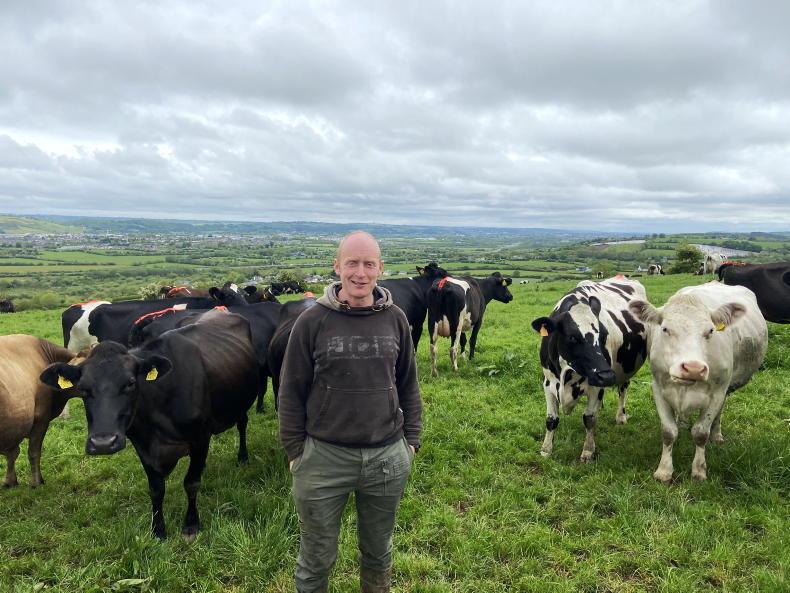
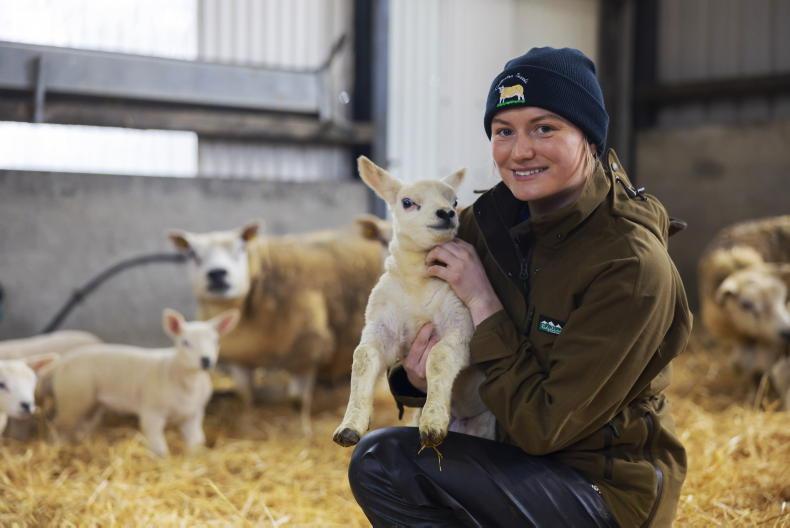
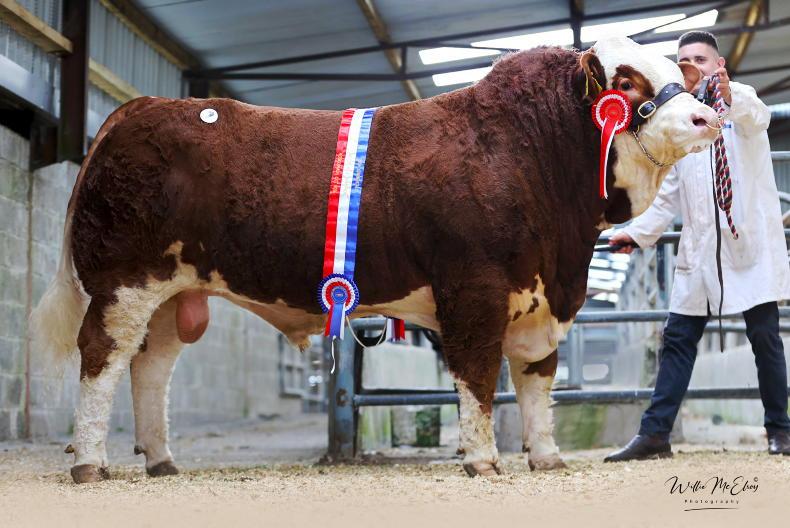
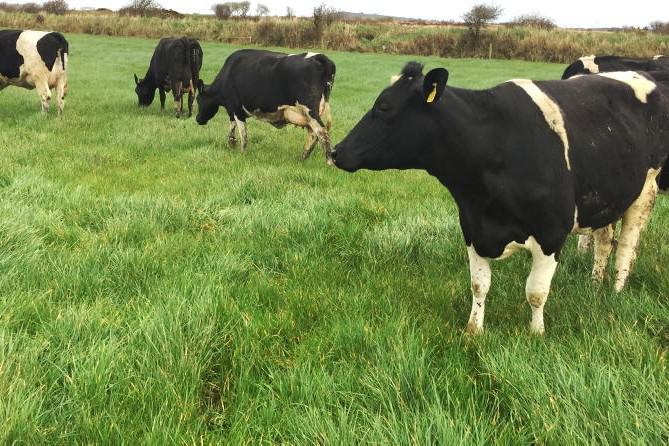
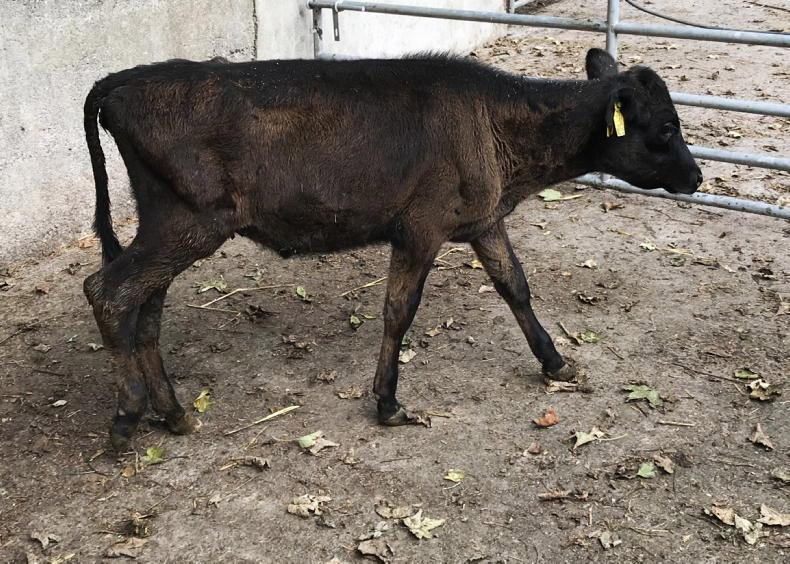
SHARING OPTIONS